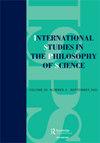Establishing Causal Claims in Medicine
IF 0.8
2区 哲学
Q2 HISTORY & PHILOSOPHY OF SCIENCE
International Studies in the Philosophy of Science
Pub Date : 2019-01-02
DOI:10.1080/02698595.2019.1630927
引用次数: 42
Abstract
ABSTRACT Russo and Williamson [2007. “Interpreting Causality in the Health Sciences.” International Studies in the Philosophy of Science 21: 157–170] put forward the following thesis: in order to establish a causal claim in medicine, one normally needs to establish both that the putative cause and putative effect are appropriately correlated and that there is some underlying mechanism that can account for this correlation. I argue that, although the Russo–Williamson thesis conflicts with the tenets of present-day evidence-based medicine (EBM), it offers a better causal epistemology than that provided by present-day EBM because it better explains two key aspects of causal discovery. First, the thesis better explains the role of clinical studies in establishing causal claims. Second, it yields a better account of extrapolation.建立医学上的因果关系
Russo和Williamson[2007]。"解释健康科学中的因果关系"[科学哲学的国际研究][21:157-170]提出了以下论点:为了在医学上建立因果关系,人们通常需要确定假定的原因和假定的结果是适当相关的,并且存在一些潜在的机制可以解释这种相关性。我认为,尽管Russo-Williamson论文与当今循证医学(EBM)的原则相冲突,但它提供了比当今循证医学更好的因果认识论,因为它更好地解释了因果发现的两个关键方面。首先,本文更好地解释了临床研究在建立因果关系方面的作用。其次,它可以更好地解释外推。
本文章由计算机程序翻译,如有差异,请以英文原文为准。
求助全文
约1分钟内获得全文
求助全文
来源期刊

International Studies in the Philosophy of Science
HISTORY & PHILOSOPHY OF SCIENCE-
自引率
12.50%
发文量
10
期刊介绍:
International Studies in the Philosophy of Science is a scholarly journal dedicated to publishing original research in philosophy of science and in philosophically informed history and sociology of science. Its scope includes the foundations and methodology of the natural, social, and human sciences, philosophical implications of particular scientific theories, and broader philosophical reflection on science. The editors invite contributions not only from philosophers, historians, and sociologists of science, but also from researchers in the sciences. The journal publishes articles from a wide variety of countries and philosophical traditions.
 求助内容:
求助内容: 应助结果提醒方式:
应助结果提醒方式:


